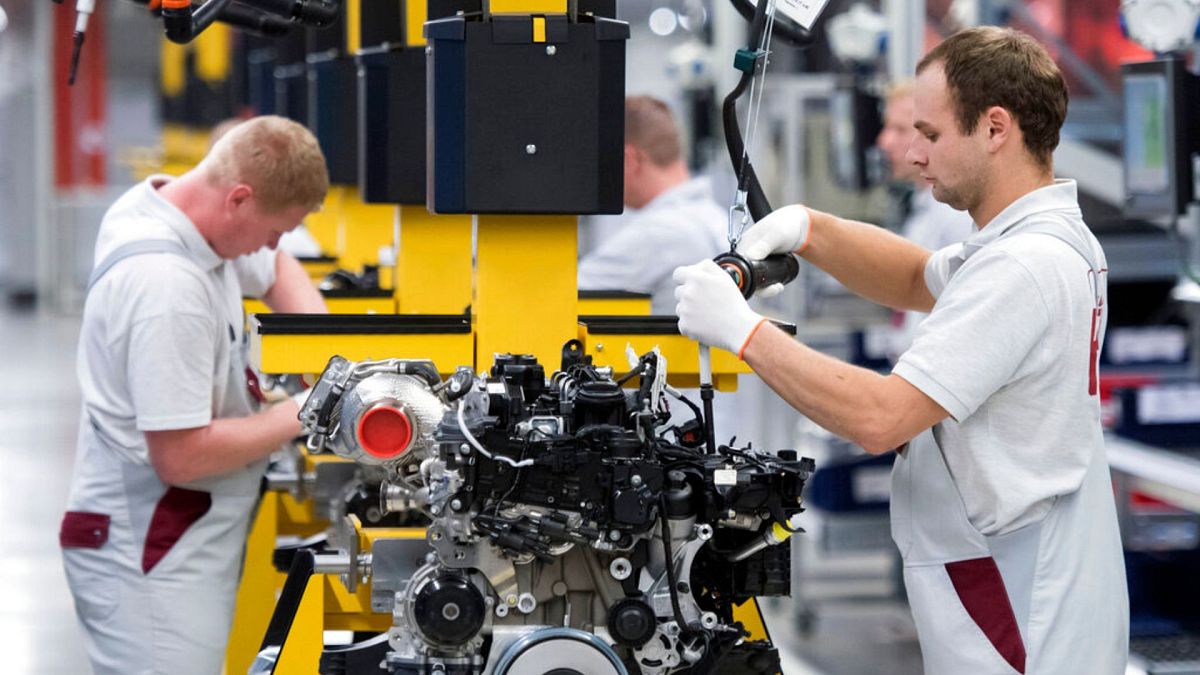Switching to EVs could cost German car industry 186,000 jobs by 2035

EV car production requires fewer employees overall than in the past, according to new report findings.
Transforming the car industry in Germany to produce EVs could cost around 186,000 jobs by 2035 – a quarter of these have already been lost, according to a new report commissioned by the German Association of the Automotive Industry (VDA).
It comes as the European car industry is facing a crisis due to drastically changing market conditions. The push to switch to electric vehicles has led to a transformation that has impacted several companies already, including Germany’s very own Volkswagen. It has carried out drastic cost cuts – and announced plans on Monday to close three plants in Europe’s biggest economy.
The report “Employment prospects in the automotive industry”, by Prognos Research Institute suggests that there have been 75,000 jobs lost since 2019 in the car industry, with almost 8,900 of the layoffs concerning jobs in metalworking.
The final count was offset by an increase of 29,000 new hires, with more than 10,000 new positions in automotive engineering, resulting in a net loss of 46,000 jobs in the car industry.
By 2035, when battery-electric vehicles only are to be manufactured, an additional 140,000 jobs could be lost.
The final count could be affected by the number of skilled workers available, as well as by the political framework that could encourage or deter new investments.
“The transformation of our industry is a mammoth task. The companies in the German automotive industry and their employees are making great efforts to ensure that it succeeds. There is no doubt about that,” said VDA President Hildegard Müller, adding that “German car manufacturers and automotive suppliers worldwide are investing around €280bn in research and development alone between 2024 and 2028, and a further €130bn euros in converting the plants. The investments underline the will of the German automotive industry to make the transformation a success story. We want change.”
Which jobs are the most at risk?
There were increases in jobs in automotive engineering, technical research and development as well as in computer science, electrical engineering and software development since 2019.
For example, employment in IT jobs in the automotive industry has increased by around a quarter since 2019 and by as much as 85% since 2013.
For the future, occupations in computer science, information and communication technology as well as mechatronics, energy and electrical occupations are becoming more relevant.
On the other hand, metal construction and welding technology or metal processing jobs have less and less relevance – and fewer workers.
There is an expected oversupply of workers in business management and administration, occupations that are expected to be less relevant.
The report notes that recruiting skilled workers for the necessary fields promises to be a challenge in certain fields and suggests training courses within the companies.
The report ends with a stark outlook, stating that regular surveys conducted by the VDA among its members of the automotive medium-sized sector show that more and more companies (82%) are postponing, relocating or completely cancelling investments that were actually planned in Germany. More than one in three companies (37%) are planning to relocate investments abroad.
The study is calling for policymakers in Europe and Germany to improve competitiveness, by tackling energy prices, bureaucracy, offering a competitive tax system and more free trade agreements, among other requests.
Related
ForexLive European FX news wrap: Euro stays buoyed, markets wait…
Headlines:Markets:EUR leads, AUD lags on the dayEuropean equities lower; S&P 500 futures up 0.1%US 10-year yields down 2.7 bps to 4.255%Gold up 0.4% to $2,9
European shares fall as tariff uncertainties weigh; US jobs data…
(Reuters) - European shares fell on Friday as frequent shifts in U.S. trade policy throughout the week resulted in risk aversion, while focus remained on th
US economy added 151,000 new jobs in February; Euro on…
US jobs report releasedNEWSFLASH: Hiring across the US economy picked up slightly at the start of Donald Trump’s second term in office.The US economy added 15












